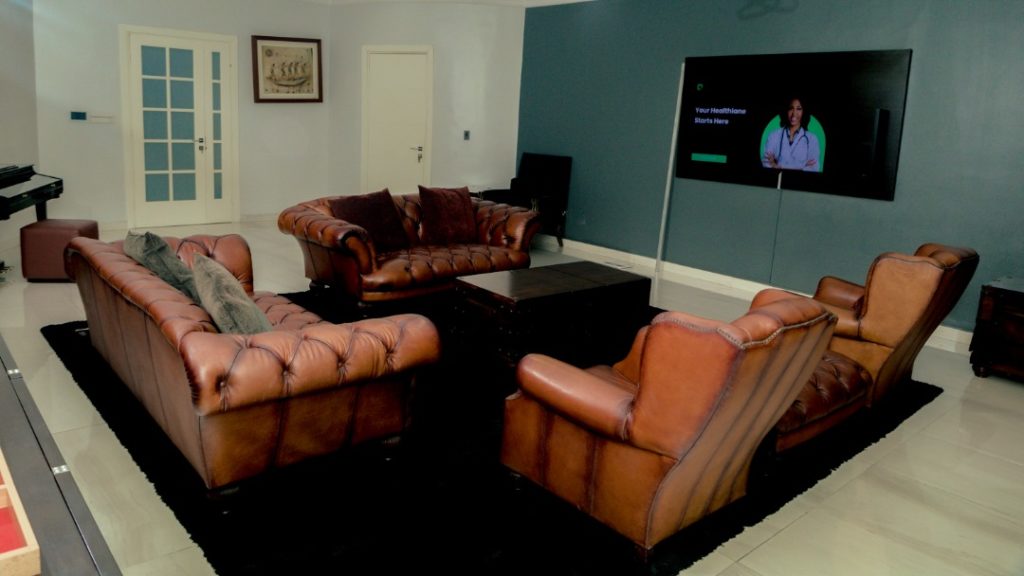Alain Nteff wanted to make hospitals obsolete through his startup Healthlane, but his unbridled spending and erratic decisions have led to the company’s end. TechCabal spoke with over 10 past employees and obtained documents that revealed the celebrated founder’s behaviour and the true picture of things at the startup.
In May 2021, when Sabina*, a product marketer, applied to work at Healthlane, a preventive healthcare startup based in Cameroon and Nigeria, that provides health check services, she was excited to join a budding innovative company.
Her interview took place at the five-star Eko Hotels & Suites in Lagos, Nigeria, over lunch, and within the week she received her offer letter to start at Healthlane the following month.
The startup, which was founded in 2019 by Alain Nteff and Agbor Ashu, offered a generous salary and mouth-watering perks for its employees. It provided lunch to staff; weekly swimming lessons and a gym instructor; an Oura ring, a health monitoring wearable device; and work tools—laptop and iPad. Some Healthlane employees were offered accommodation onsite in a six-bedroom mansion, part of which doubled as office space.
Healthlane was part of Y Combinator’s winter batch in 2020. After graduating from the accelerator, it raised $2.4 million from Silicon Valley’s topmost investors such as Sequoia Capital and Silicon Valley Bank, and was set to take the healthcare world by storm.
But by the second half of 2021, an imminent implosion started to brew at the startup, according to interviews with 12 former and current employees—many of whom spoke on condition of anonymity.
It started with Nteff making changes to marketing campaigns and product features. During product meetings Nteff made sudden changes and new feature requests, often disrupting previously agreed plans.
These series of erratic decisions by Nteff led to resignations and terminations—Sabina was one of such. By December 2021, the company couldn’t pay employee salaries despite Nteff assuring employees that the startup had over $1 million cash in the bank.
“It was a great place from the outside, there was a spacious house, food and other perks, so you won’t think there’s anything wrong. But Alain was always making changes, so it was difficult to move forward,” Sabina told TechCabal.
It’s not clear how Healthlane blew through $2.4 million within a year, but many past employees suspect that some of the funds were diverted to activities and ventures outside Healthlane.
There were accounts by past employees of Nteff diverting company funds. This included the sum of $109,000 (XAF 68 million) meant for a GAVI project, XAF 12 million ($18,500) investment by the Cameroon Angel Network meant for staff salaries, and the $50,000–$100,000 equity-free grant gotten from Google in September.
Eyebrows were raised at business transactions with Infiuss Health, owned by Melissa Bime, who three past employees claim was Nteff’s girlfriend.
Income from a group known as “funded tech bros” was flagged by three former employees who maintained that Healthlane never provided service to this group.
There were also claims by three former employees that Nteff got involved in cryptocurrency. It’s not clear whether Nteff invested the company’s funds in crypto.
Many past employees, some of whom are owed four–six months’ salaries, are aggrieved by what they describe as Nteff’s deceitfulness and are even considering a class action suit against the founder, who they say is currently hiding from them, vendors and investors.
“Between April and July 2022 when Alain was living at Eko Hotel, I had to call him and told him that even though salaries haven’t been paid you need to show up at the office. You employed us and you’re hiding from us,” Olatunde, a former employee, told TechCabal.
Another former employee, Cynthia*, told us: “The issue here is that Healthlane is heavily indebted. You cannot be working to better the lives of people and not care about your employees’ mental health. How can people be at a job for six months without being paid a salary? If you’re bankrupt, declare it and let everyone move on.”
Nteff declined to be interviewed for this article, saying that “many of the statements are factually incorrect” and there’s “an ongoing legal investigation into illegal access of Healthlane files by journalists.”
“At the conclusion of this investigation, we will be happy to issue a full statement,” Nteff told TechCabal via email.

An early taste of success
Raised in Cameroon as the only child of a single mother, Nteff chose to study computer science at the National Advanced School of Engineering in Yaoundé despite his mother’s desire for him to become a medical doctor.
His idea to solve the problem of people receiving substandard care in the healthcare space was birthed in 2012 when Nteff, then a 20-year-old engineering student, visited a rural Cameroon hospital, where he saw pregnant women waiting for hours and not being attended to. Nteff founded GiftedMom, a service providing health information to pregnant women, to solve the challenge of women travelling thousands of miles to health centres only to receive substandard care or not be attended to.
Over the next seven years, GiftedMom scaled from helping 20 mothers within a community to reaching 500,000 mothers in Cameroon, Côte d’Ivoire, Mauritania, and Nigeria through digital channels. GiftedMom also introduced “fast-track lanes” within hospitals in order to ensure that pregnant women got urgent and quality care when they visited.
The success of GiftedMom brought Nteff accolades. In 2014, he emerged as one of the winners of the 2014 Anzisha prize, a three-year fellowship programme that supports the growth of young entrepreneurs, and recognises their achievements. The prize came with a $25,000 grant. The following year Nteff was one of three Cameroonians who received the Young Leader Award from the Queen of England. He was later recognised by Bill Gates and Rwandan president Paul Kagame for his contributions to the health sector in Africa.
The accolades helped GiftedMom gain more traction and attract additional funding in grants, but it wasn’t enough to attract traditional investors.
“We had been speaking to many investors for two years who had different conditions and requirements. We even did about three audits by Deloitte,” Nteff said in a recent podcast interview.
At the end of 2019, after two years of failed attempts to raise funding to expand GiftedMom, Nteff set his eyes on getting into Y Combinator (YC), the prestigious American accelerator.
“In November or maybe August 2019, after everyone went home that night, I sat in the office and I told myself, I’m not taking money from these guys [investors]. I’m going to get us into Y Combinator,” Nteff said to the interviewer, recounting the moment he resolved to get into YC after an investor bailed on GiftedMom.
A few months later, GiftedMom got into Y Combinator’s 2020 winter programme, a move that ended the company’s funding worries. Within three months of graduation, the startup had closed $2.4 million in funding from VC investors. The startup also changed its name to Healthlane, a more befitting name for a “billion-dollar company”, as suggested by Talia Frenkel, a YC partner.
“When we got into the programme one thing Talia [Frenkel], the YC partner for my group, said was you need to change the name from Gifted Mom because I don’t see GiftedMom as the name of a billion-dollar company,” Nteff said in the aforementioned podcast interview.
The final phase of the startup’s transformation happened a few months later when the death of Nteff’s mother, who was misdiagnosed with typhoid and malaria whereas she had sepsis, led him to pivot the business towards providing preventive healthcare.
Making hospitals “obsolete”
The company’s pivot meant that Healthlane was now focused on conducting comprehensive health checks which included kidney, heart, diabetes and blood tests to spot any anomalies way ahead of time. The company charged customers a fee that ranged from $60–250 per health check.
“Many times when he said the goal of Healthlane is to make hospitals obsolete, I understood this to mean that the practice of going to the hospital only when you’re sick isn’t the best route and the quality of healthcare people received could be better,” said former employee, Olatunde, who joined the company in August, and who happens to be a doctor. “However, as a medical practitioner, I knew he said that mostly just to motivate employees because based on all the things he pitched Healthlane as, we were never going to replace hospitals.”
This pivot wasn’t welcomed by some investors. Dunnie, one of the first set of employees hired, told TechCabal that Nteff had once mentioned that some investors weren’t in support of this pivot because he had raised funds on the back of the promise that Healthlane will become a telemedicine app.
Healthlane started hiring its first set of employees during the second quarter of 2021. For its office, Nteff chose a plush $50,000-per-annum-rent, mansion in Lekki, Lagos, which was converted to an office building. The mansion was fully furnished and had a pool and cinema room.

“I just thought I was stretching myself”
The first sign of implosion for Sabina was when she noticed Nteff constantly changing his mind on decisions.
She recalled him reaching out one evening by 6 PM to ask her to get two models (male and female), a photographer and lab coats for a photoshoot the next day. The shoot took place as scheduled, with Nteff being present.
After a week he came back to say he didn’t like the images and that the marketing team should do a new shoot, which they did. Sabina claims that the pictures from the first shoot are what Healthlane uses on its website today.
“At that point, I didn’t think anything was wrong, I just thought I was stretching myself,“ Sabina said.
The moment when she noticed things were getting out of hand was when she realised she started avoiding him because he’d ask her for what she was working on and then revise the plans.
“At a point, I was beginning to think I didn’t know this marketing again,” Sabina said.
Dunnie, who worked at Healthlane as a product manager, told TechCabal that employees bore the brunt of Nteff’s ineptitude. “He makes these abrupt decisions that aren’t backed by data and then everyone gets the heat for it, except him,” she said.
Many past employees described Nteff as being open to ideas, but also erratic and set in his ways.
“Alain will just stand up in the morning and say an employee isn’t performing, and I’ll ask him, have you checked the person’s KPIs?” Cynthia said. “Have you evaluated the person properly? Have you given the person the necessary resource and training to perform their tasks and meet their objectives?”
These erratic decisions led to wastage and redundancy in the procurement of medical equipment, which Ashu, Healthlane’s co-founder, was more involved in.
“I and my medical colleagues at Healthlane often had conversations where we were all surprised at the announcement that the company had purchased new medical equipment,” said Olatunde. He referred to an instance where an immunology analyser, which was procured without proper research for hormonal studies, had to be replaced with a new one because it wasn’t producing consistent results.
Another time, the company procured four hematology analysers which were slow and deemed unnecessary by Olatunde, and had to be abandoned because they already had a functional hematology analyser. By August 2022, about 700–800 reagent discs expired at the Lagos office, despite multiple alarms raised by Olatunde and his colleague, who questioned the rationale behind procuring excessive amounts of reagent discs at a time.
“Considering that I was the one on the ground attending to patients, I expected to be at least consulted on these issues,” Olatunde said.

A weak or non-existent co-founder
Ashu was described by many past employees as a quiet co-founder who mostly spent his time working with the nurses and doctors, and recommending care plans to patients. Several employees shared that when they reached out to Ashu to complain about Nteff’s behaviour and unpaid salaries, he referred them back to Nteff.
One former employee shared that Ashu had told them that he had taken his hands off the company as he was also being owed XAF 17 million ($26,500) which he lent Healthlane to pay salaries and cover operation costs.
“It was obvious that Alain was the main man and Agbor was just a figurehead,” Olatunde said.
Some former employees are sceptical of Ashu’s blamelessness in all of this, with some expecting him to have resigned from his position or raised the alarm to the company’s investors if he wasn’t part of Nteff’s suspicious activities. Ashu didn’t respond to TechCabal’s request for comment.
High burn rate, suspicious income, and rising debts
There are questions about how money came into Healthlane and how it went out, considering that it contributed to the company incurring debts and lawsuits from disgruntled vendors.
According to documents seen by TechCabal, Healthlane owed vendors in Cameroon XFA 35 million (~$55,000) as of August 2022. In Lagos, the company owes utility bills (power and local government levy) of ₦714,000 (~$1,000).
Notably, on November 15 2021, Bime (CEO, Infiuss Health) loaned Healthlane $400,000, according to a document seen by TechCabal. Bime would later sue Nteff in May 2022 for failure to repay the loan which was due to be paid back on November 30, 2021.
Several employees shared that the company had taken loans from two fintech startups: Float and PayHippo. TechCabal obtained a document which indicated Healthlane hadn’t repaid a ₦5 million (~$7,000) loan to Float; the loan had accrued interest of almost ₦1 million as of August 2022.
“Some of the numbers were not reconciling because Alain would just come and say, ‘Send out this invoice to this person’, and they’d send us money for a job that we did not do,” Ngo, a former employee told TechCabal. “Then I just used to laugh and say, ‘You people are doing money laundering in this company’, because we’re talking about millions of naira being transferred.”
One of such invoices was sent out to the aforementioned entity, “funded tech bros”, for health checks, supplements and vaccination services. Many past employees also mentioned similar transactions happening with Infiuss Health.
During company meetings, the Nigerian employees raised concerns that the company’s burn rate was too high. The concerns were downplayed by Nteff who assured them that the company had enough cash to see the company through, referring to the over $1 million the company had in the bank.
Employee feeding costs averaged at about ₦500,000–600,000 ($700–850) per week for a team size that wasn’t more than 10–12 employees at any point in time, according to Ngo. The company paid for Nteff’s trips (some personal) and stays in hotels, sometimes covering the expenses of his friends.
Healthlane had extra security personnel, mobile police officers (MOPOs), which cost over ₦500,000 monthly, and this raised eyebrows among employees who felt it was excessive for a small operations team that didn’t handle cash.
“We struck a deal to pay about ₦150,000 each to these three MOPOs who rotated, and then ₦200,000 to their boss every month,” Ngo said. Healthlane also often provided lunch for the MOPOs.
Money issues, layoffs and the right-hand man
Healthlane’s financial troubles became evident in December 2021 when the company started owing vendors and didn’t pay employees their salaries on time.
“In December, when the money issues began, Emma [Nteff’s executive assistant] said we were having issues converting crypto to dollars before converting it to Naira,” Ngo said. “I was wondering, does YC pay in crypto?” Another former employee confirmed having conversations with Nteff where he severally admitted to be converting crypto to dollars.
Two days before the company’s Christmas party in 2021, Ngo was told that the money had come, but it was in the bank account of Nteff’s personal assistant, Fadeyi Mustapha (often called Fade by his colleagues). She would later find out that the money was a loan Mustapha had taken on behalf of the company.
“Earlier on, I had issues with Fade because he majorly bought things for the company and often failed to produce backing receipts to justify the amount he said he spent,” Ngo said. “When I questioned him, it always ended up with arguments where Fade would say stuff like, ‘You’re not my wife, you’re not supposed to be talking to me like that. I have your type at home!’”
Many past employees expressed concerns about Mustapha, who they claimed was Nteff’s, right-hand man.
“Fade has a lot to answer. The company did a lot of spending through Fade. We once bought an engine for Fade’s car,” Ngo said.
TechCabal reached out to Mustapha for comment but he declined.
Healthlane closed 2021 with a Christmas party and its employees went home expecting to receive their salaries as usual, but they weren’t paid. The December salaries were paid over an extended period of time the following year, with the last set of employees being paid their December salary on February 10.
While salaries were being owed, during bi-monthly staff meetings the company update slides shared by Nteff still indicated that the company had over $1 million in its bank account. The reasons for not being able to pay salaries were the same, ranging from issues with the company’s bank account and difficulties converting money.
Amid the company’s financial struggles, several employees shared that Nteff abruptly fired employees. Two former employees explained that while Nteff typically attributed the reason for firing employees to them not performing on the job, the real reason for the firings was that the company was trying to cut down costs.
In mid-February 2022, Ngo sent in her resignation letter which had a month’s notice period. The letter was accepted, only for Nteff to turn around two days later to terminate her employment. It was a move she believes was made to absolve the company of the responsibility of paying her a salary during her notice period.
“They claimed they wanted me to use the remaining part of the new month to rest because I was pregnant,” Ngo said. “I told them I’m only pregnant, I’m not a labourer or a farmer that needs to rest.”
Dunnie, who was fired in March 2022 said, “He accused me of not performing and then he fired me. I challenged him, asking him how. I will not have you disrespect me by telling me I wasn’t performing.”
She added that in the first three months of 2022, six people were fired at Healthlane. Healthlane disputed this claim when TechCabal reached out in April this year and went on to state that, “For legal reasons, we cannot specify who on that list was fired by us, when, nor the reasons for those dismissals.”
Silence and looming questions
On September 6, 2022, Healthlane was announced as one of the 60 African startups that were selected for the second cohort of the Google for Startups Black Founders Fund. This announcement meant that Healthlane will receive equity-free funding between $50,000 and $100,000, and up to $200,000 in Google Cloud credit.
Surprisingly, employees of Healthlane heard about this news online and many claim that till today there has been no mention of the fund by Nteff. A former employee who was privy to the company’s banking information, shared that there was no sign that funding from Google entered the company’s bank account.
“We were happy at first when we heard about this news. It meant that finally our salaries would be paid, but nothing has changed,” a former employee who resigned out of frustration, shortly after the Google Black Founders Fund announcement, told TechCabal.
Many past employees of Healthlane are asking what the company’s investors are doing about the current situation and are considering a number of options to get recompense. TechCabal has reached out to a number of Healthlane investors but is yet to get a response.
“It looks like premeditated fraud as we haven’t heard from the company in a while. The whole situation is really shady and confusing,” Olatunde said.
*Name changed to protect the person’s identity.















